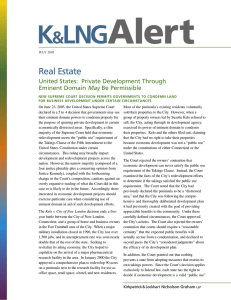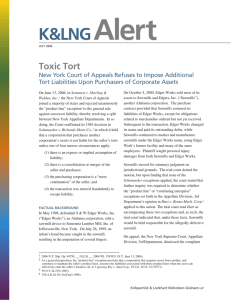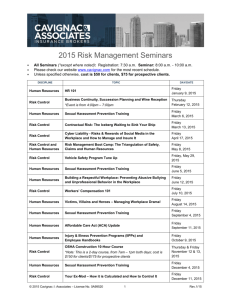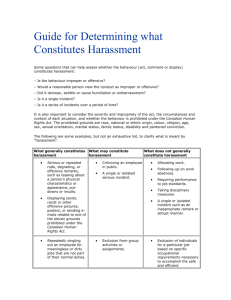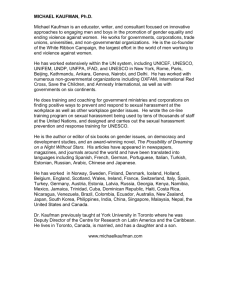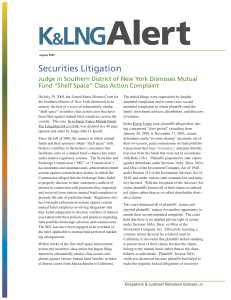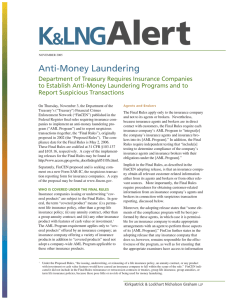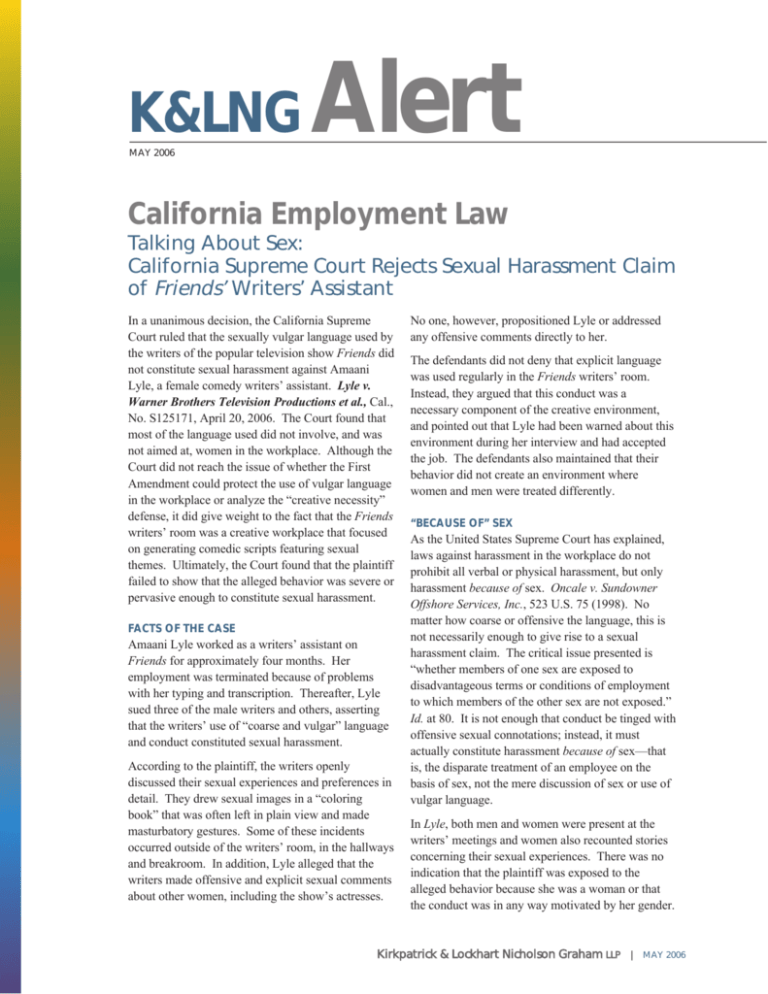
K&LNG
MAY 2006
Alert
California Employment Law
Talking About Sex:
California Supreme Court Rejects Sexual Harassment Claim
of Friends’ Writers’ Assistant
In a unanimous decision, the California Supreme
Court ruled that the sexually vulgar language used by
the writers of the popular television show Friends did
not constitute sexual harassment against Amaani
Lyle, a female comedy writers’ assistant. Lyle v.
Warner Brothers Television Productions et al., Cal.,
No. S125171, April 20, 2006. The Court found that
most of the language used did not involve, and was
not aimed at, women in the workplace. Although the
Court did not reach the issue of whether the First
Amendment could protect the use of vulgar language
in the workplace or analyze the “creative necessity”
defense, it did give weight to the fact that the Friends
writers’ room was a creative workplace that focused
on generating comedic scripts featuring sexual
themes. Ultimately, the Court found that the plaintiff
failed to show that the alleged behavior was severe or
pervasive enough to constitute sexual harassment.
FACTS OF THE CASE
Amaani Lyle worked as a writers’ assistant on
Friends for approximately four months. Her
employment was terminated because of problems
with her typing and transcription. Thereafter, Lyle
sued three of the male writers and others, asserting
that the writers’ use of “coarse and vulgar” language
and conduct constituted sexual harassment.
According to the plaintiff, the writers openly
discussed their sexual experiences and preferences in
detail. They drew sexual images in a “coloring
book” that was often left in plain view and made
masturbatory gestures. Some of these incidents
occurred outside of the writers’ room, in the hallways
and breakroom. In addition, Lyle alleged that the
writers made offensive and explicit sexual comments
about other women, including the show’s actresses.
No one, however, propositioned Lyle or addressed
any offensive comments directly to her.
The defendants did not deny that explicit language
was used regularly in the Friends writers’ room.
Instead, they argued that this conduct was a
necessary component of the creative environment,
and pointed out that Lyle had been warned about this
environment during her interview and had accepted
the job. The defendants also maintained that their
behavior did not create an environment where
women and men were treated differently.
“BECAUSE OF” SEX
As the United States Supreme Court has explained,
laws against harassment in the workplace do not
prohibit all verbal or physical harassment, but only
harassment because of sex. Oncale v. Sundowner
Offshore Services, Inc., 523 U.S. 75 (1998). No
matter how coarse or offensive the language, this is
not necessarily enough to give rise to a sexual
harassment claim. The critical issue presented is
“whether members of one sex are exposed to
disadvantageous terms or conditions of employment
to which members of the other sex are not exposed.”
Id. at 80. It is not enough that conduct be tinged with
offensive sexual connotations; instead, it must
actually constitute harassment because of sex—that
is, the disparate treatment of an employee on the
basis of sex, not the mere discussion of sex or use of
vulgar language.
In Lyle, both men and women were present at the
writers’ meetings and women also recounted stories
concerning their sexual experiences. There was no
indication that the plaintiff was exposed to the
alleged behavior because she was a woman or that
the conduct was in any way motivated by her gender.
Kirkpatrick & Lockhart Nicholson Graham LLP |
MAY 2006
The majority of the sexually coarse and vulgar
language did not involve, and was not directed at, the
plaintiff or other women in the workplace.
Furthermore, the Court stated that “[t]he
circumstance that this was a creative workplace
focused on generating scripts for an adult-oriented
comedy show featuring sexual themes is
significant…”
The Court found that Lyle failed to present evidence
of discrimination sufficient to survive the defendants’
motion for summary judgment and remanded the
matter to the Court of Appeal with directions to
affirm the summary judgment order insofar as it
pertained to plaintiff’s sexual harassment action.
This ruling does not mean that vulgar language could
never constitute sexual harassment. In this situation,
however, the plaintiff did not show that the alleged
language was discriminatory rather than merely
offensive. Having found that Lyle’s factual showing
was insufficient, the Court did not reach the issue of
whether liability for the alleged language might
infringe on the defendants’ rights of free speech.
The Lyle ruling epitomizes the nebulous and factdependent nature of sexual harassment cases. In
some situations, the mere presence of a pin-up
calendar could constitute sexual harassment. In
others, even the pervasive use of sexually-charged
language is not enough. When determining whether
conduct constitutes harassment or discrimination,
courts examine each case individually, and what is
2
appropriate in one workplace is not necessarily
appropriate in another.
The good news for California employers: even
behavior that is admittedly vulgar may not create
liability for sexual harassment if the complaining
employee cannot show that the behavior was either
directed towards him or her or otherwise was so
severe and pervasive as to alter the employee’s
working conditions. Most employers, however, will
not be able to rely upon the specific circumstances
present here. In Lyle, the alleged behavior arose out
of a creative workplace responsible for creating
comedy shows with sexual themes. In such a setting,
it is difficult to separate those conversations that were
properly part of the working environment and those
that might have crossed the line into sexual
harassment. In a different setting, the Court might
have found that the language and behavior
constituted sexual harassment, even if it was not
directed at the complaining employee. As always,
employers should err on the side of caution when
evaluating what behavior will be tolerated in the
workplace.
Paul W. Sweeney, Jr.
psweeney@klng.com
310.552.5055
Jennifer L. Wayne
jwayne@klng.com
310.552.5084
Kirkpatrick & Lockhart Nicholson Graham
LLP
| MAY 2006
If you have questions about this topic or would like more information on Kirkpatrick & Lockhart Nicholson Graham LLP,
please contact one of our lawyers listed below:
BOSTON
Henry T. Goldman
Mark D. Pomfret
NEWARK
617.951.9156 hgoldman@klng.com
617.261.3147 mpomfret@klng.com
Rosemary Alito
Vincent N. Avallone
Marilyn Sneirson
214.939.4959 vhays@klng.com
214.939.4902 jramon@klng.com
NEW YORK
973.848.4022 ralito@klng.com
973.848.4027 vavallone@klng.com
973.848.4028 msneirson@klng.com
DALLAS
Von E. Hays
Jaime Ramón
717.231.4503 cstrouss@klng.com
+44.20.7360.8194 pcallegari@klng.com
LOS ANGELES
Thomas H. Petrides
Paul W. Sweeney, Jr.
310.552.5077 tpetrides@klng.com
310.552.5055 psweeney@klng.com
MIAMI
April L. Boyer
Linda L. Usoz
650.798.6702 lusoz@klng.com
PITTSBURGH
LONDON
Paul Callegari
212.536.3905 eciko@klng.com
PALO ALTO
HARRISBURG
Carleton O. Strouss
Eva M. Ciko
David J. Kolesar
Stephen M. Olson
Michael A. Pavlick
Hayes C. Stover
dkolesar@klng.com
solson@klng.com
mpavlick@klng.com
hstover@klng.com
SAN FRANCISCO
Jonathan M. Cohen
305.539.3380 aboyer@klng.com
412.355.6252
412.355.6496
412.355.6275
412.355.6476
415.249.1029 jcohen@klng.com
Judd J. Goldberg
305.539.3344 jgoldberg@klng.com
WASHINGTON
Carol C. Lumpkin
305.539.3323 clumpkin@klng.com
Lawrence C. Lanpher 202.778.9011 llanpher@klng.com
Michael C. Marsh
305.539.3321 mmarsh@klng.com
www.klng.com
BOSTON • DALLAS • HARRISBURG • LONDON • LOS ANGELES • MIAMI • NEWARK • NEW YORK • PALO ALTO • PITTSBURGH • SAN FRANCISCO • WASHINGTON
Kirkpatrick & Lockhart Nicholson Graham (K&LNG) has approximately 1,000 lawyers and represents entrepreneurs, growth and middle market companies, capital
markets participants, and leading FORTUNE 100 and FTSE 100 global corporations nationally and internationally.
K&LNG is a combination of two limited liability partnerships, each named Kirkpatrick & Lockhart Nicholson Graham LLP, one qualified in Delaware, U.S.A. and
practicing from offices in Boston, Dallas, Harrisburg, Los Angeles, Miami, Newark, New York, Palo Alto, Pittsburgh, San Francisco and Washington and one
incorporated in England practicing from the London office.
This publication/newsletter is for informational purposes and does not contain or convey legal advice. The information herein should not be used or relied upon in
regard to any particular facts or circumstances without first consulting a lawyer.
Data Protection Act 1988—We may contact you from time to time with information on Kirkpatrick & Lockhart Nicholson Graham LLP seminars and with our regular
newsletters, which may be of interest to you. We will not provide your details to any third parties. Please e-mail cgregory@klng.com if you would prefer not to
receive this information.
© 2006 KIRKPATRICK & LOCKHART NICHOLSON GRAHAM LLP. ALL RIGHTS RESERVED.
Kirkpatrick & Lockhart Nicholson Graham
LLP
|
MAY 2006


